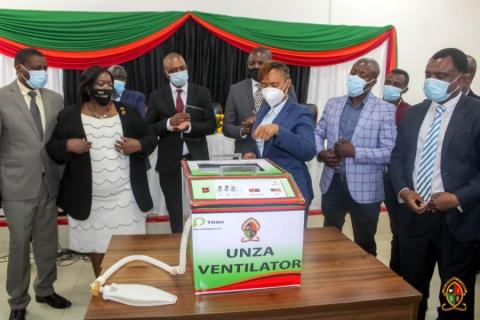
The University of Zambia (UNZA) through the School of Engineering and the Technology Development and Advisory Unit (TDAU), with the support from stakeholders, have developed a COVID 19 mechanical Ventilator Prototype aimed at cushioning the shortages of ventilators in the hospitals.
And the Minister of Higher Education Dr Brian Mushimba in a speech read on his behalf by the Permanent Secretary at the Ministry of Higher Education Mrs Siame Kayula said developing a COVID 19 mechanical ventilator by the engineers has demonstrated that it was possible to find solutions to many of challenges within boarders.
“I am informed that the UNZA/TDAU project team worked hand in hand with experts in critical care from the Ministry of Health during the development of this product. I highly commend these efforts and collaboration and I am therefore very hopeful that the launch of this ventilator is only the beginning of added financial and technical support towards ridding ourselves of the pandemic,” he said. Dr Mushimba said the Ministry hoped that launching the medical ventilator will ensure more production of such ventilators and demonstrate the ability of local manufacturers to design and produce more local products.
“The world as we know it has been turned upside down socially, economically and all other aspects. The challenges brought about by this pandemic have been a wake-up call to all of us to put our efforts together in ensuring that we find solutions that will prevent our lives from being further disrupted,” he said.
Dr Mushimba said the Ministry of Higher Education was responsible for the promotion of science, technology and innovation in Zambia. In fulfilment of this task, the Ministry implements its strategies through institutions such as the National Technology Business Centre (NTBC) which through the Technology Business Development Fund (TBDF) contributed an initial K100, 000 towards the development of the ventilator.
“This milestone could not have been achieved without the assistance of other partners such as Lafarge and Zambia Breweries who matched the resources by supporting this effort with K103,000 and ensuring that the project is not only achieved but creates a pathway for making available the means to recovery by the COVID 19 patients,” he said.
Dr Mushimba further said the government has called on initiatives that will assist prevent the spread of the virus and improvements in its treatment hence with such committed support as has been demonstrated by the NTBC, Zambia Breweries, Lafarge and UNZA/TDAU, it should be each ones prayer that a permanent solution could be found and life would be restored to normalcy.
“Allow me to extend my gratitude to the NTBC, Zambia Breweries, Lafarge plc, TDAU, the School of Engineering and the University of Zambia at large for responding to this urgent need and for spearheading the local production of the technology. it is my hope and government’s expectation that the technology being launched today will positively impact the health sector and provide the much-needed tools towards the fight against the covid 19 pandemic,” he said.
And the University of Zambia Acting Vice-Chancellor Dr Tamala Kambikambi said the idea to develop the ventilator was in response to the reported ventilator shortages which were experienced in most hospitals not only in Zambia but across the globe.
“When reports of ventilator shortages started, engineers, physicians and experts at universities around the world formed groups to help address the projected potential ventilator shortage. similarly, UNZA, through the School of Engineering and the Technology Development and Advisory Unit (TDAU), constituted a team to develop and manufacture a mechanical ventilator prototype, which we are launching today. The team worked closely with a critical care specialist and biomedical engineering technical personnel from Maina Soko Military hospital and the University Teaching Hospital (UTH), respectively” she said.
Dr Kambikambi said the prototype was designed to meet the minimum clinical functional requirements for safe ventilation. She added that the “Rapidly Manufactured Ventilator System” (“RMVS”) specification issued by the United Kingdom’s Medicines and Healthcare products Regulatory Agency (“MHRA”) was used in this respect.
She said the prototype provides three user inputs, namely Tidal Volume (TV), Breath per minute (RR), and Inspiration: Expiration (I: E) ratio, which was a set via three potentiometer knobs. Dr Kambikambi further said to ensure that the patient was not injured, the airway pressure was monitored with a pressure sensor connected to a sensor output on the Bag-Valve-Mask (BVM) and that additional safety measures were being planned for in future versions of the UNZA ventilator as research on the same was continuing.
Dr Kambikambi thanked the stakeholder and further appealed to the government, cooperating partners and industry to assist in building the capacity of UNZA/TDAU through infrastructure development and equipment acquisition to enable the unit to manufacture some of these items locally.